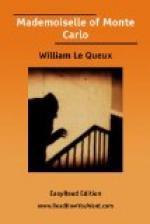Opposite High Street Kensington Station he jumped upon a bus, and at five minutes to midnight alighted at the Marble Arch. On entering the park he quickly found the seat he had indicated as their meeting place, and sat down to wait.
The home-going theatre traffic behind him in the Bayswater Road had nearly ceased as the church clocks chimed the midnight hour. In the semi-darkness of the park dark figures were moving, lovers with midnight trysts like his own. In the long, well-lit road behind him motors full of gaily-dressed women flashed homeward from suppers or theatres, while from the open windows of a ballroom in a great mansion, the house of an iron magnate, came the distant strains of waltz music.
Time dragged along. He strained his eyes down the dark pathway, but could see no approaching figure. Had she at the last moment been prevented from coming? He knew how difficult it was for her to slip away at night, for Lady Ranscomb was always so full of engagements, and Dorise was compelled to go everywhere with her.
At last he saw a female figure in the distance, as she turned into the park from the Marble Arch, and springing to his feet, he went forward to meet her. At first he was not certain that it was Dorise, but as he approached nearer he recognized her gait.
A few seconds later he confronted her and grasped her warmly by the hand. The black cloak she was wearing revealed a handsome jade-coloured evening gown, while her shoes were not those one would wear for promenading in the park.
“Welcome at last, darling!” he cried. “I was wondering if you could get away, after all!”
“I had a little difficulty,” she laughed. “I’m at a dance at the Gordons’ in Grosvenor Gardens, but I managed to slip out, find a taxi, and run along here. I fear I can’t stay long, or they will miss me.”
“Even five minutes with you is bliss to me, darling,” he said, grasping her ungloved hand and raising it to his lips.
“Ah! Hugh. If you could only return to us, instead of living under this awful cloud of suspicion!” the girl cried. “Every day, and every night, I think of you, dear, and wonder how you are dragging out your days in obscurity down in Kensington. Twice this week I drove along the Earl’s Court Road, quite close to you.”
“Oh! life is a bit dull, certainly,” he replied cheerfully. “But I have papers and books—and I can look out of the window on to the houses opposite.”
“But you go out for a ramble at night?”
“Oh! yes,” he replied. “Last night I set out at one o’clock and walked up to Hampstead Heath, as far as Jack Straw’s Castle and back. The night was perfect. Really, Londoners who sleep heavily all night lose the best part of their lives. London is only beautiful in the night hours and at early dawn. I often watch the sun rise from the Thames Embankment. I have a favourite seat—just beyond Scotland Yard. I’ve become quite a night-bird these days. I sleep when the sun shines, and with a sandwich box and a flask I go long tramps at night, just as others do who, like myself, are concealing their identity.”




